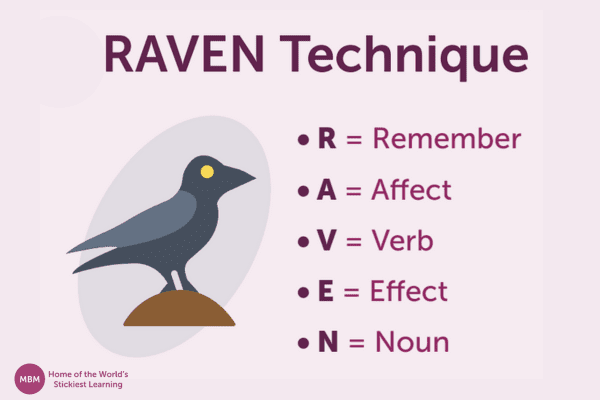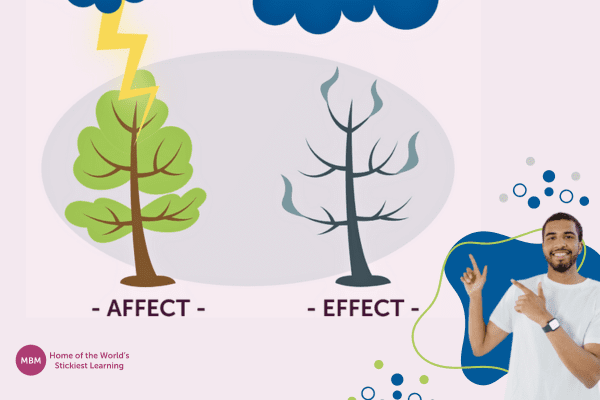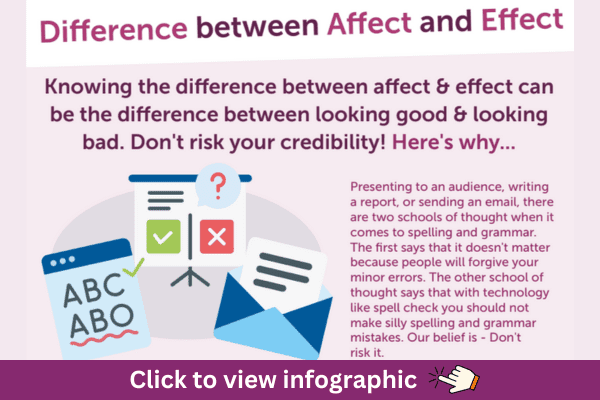Knowing This Can Determine Whether You Look Sloppy or Professional. Here’s How To Get It Right
What is the difference between affect and effect? People often get the two similar-sounding words confused. So, why does it matter? Well, presenting to an audience, writing a report, or sending an email, there are two schools of thought about mistakes in spelling and grammar.
The first is, that they don’t matter because people will forgive you for minor errors. The other school of thought says these seemingly trivial things can seem unprofessional to others and prompt criticism about other things in your work, and even micromanaging. So, don’t leave yourself open to the possibility. Play it safe, using technology like spellcheck to avoid silly spelling and grammar mistakes. All in all, wherever you can do it properly, you should.
What Is the Difference Between Affect and Effect? Your Most Popular Questions Answered

1. What is an Example of Affect and Effect?
“The cloud affects the tree by striking it with lightning. The lightning’s effect on the tree is to reduce it to ash.”
2. How Can I Remember The Difference between Affect and Effect?
Here are six ways you can remember the difference, and pick the right word every time:
Sticky Learning ® is 7 times more effective than 1-day training courses. Plus, you will get a Chain of Evidence proving your Return on Investment. Discover soft skills training that changes behaviours long term.

A. RAVEN Technique

Use the R.A.V.E.N technique, which is:
- R = Remember
- A = Affect
- V = Verb
- E = Effect
- N = Noun
Importantly, this only works if you know the difference between a verb and a noun. To get it right, it’s useful to understand that one of these two words is a verb and the other is a noun. The verb here is ‘affect,’ and a verb is a doing word, which is similar to run, dance, slide, think, and stand. The noun is ‘effect,’ and a noun is a naming word, which is similar to teacher, cleaner, social worker, footballer, and boy.
Another way to understand these two words is:
- Affect is a verb – to affect – which means to have influence or have an impact on something.
- Effect is a noun – an effect – which is the result of being affected by something.
B. Affect Substitution Method – Swap Affect for Another Verb
The other way to understand how to choose the correct word out of either affect or effect is to substitute affect for another verb. For example:
In this sentence, ‘”The cloud affects the tree by striking it with lightning,” you could substitute the word affects with something else to test if you have chosen the correct one. Hence, for example:
- Original: The cloud affects the tree.
- Substitute: The cloud tickled the tree – Yes, this works because you have successfully substituted ‘affects’ for ‘tickled’, as they are both verbs. Both doing words.
- Substitute: ‘The people felt the affect of the great storm’ – If we replace ‘affect’ with another verb, we get – ‘The people felt the jumping of the great storm’. This does not work, and so the word we should use in this sentence is ‘effect’ – The people felt the effect of the great storm’.
C. Affect Substitution Method – Change the Word ‘Affect’ for the word ‘Transform’
This builds on the method above. Instead of substituting affect for any verb, try replacing the word with the verb ‘transform.’ For example:
“What is the difference between affect and effect for dummies?”
- Original: The cloud affects the tree.
- Substitute: The cloud transforms the tree – Yes, this works because you have successfully substituted ‘affects’ for ‘transformed’, and the sentence still makes sense.
If you can change the word affect to transform and the sentence still reads well, then affect is the correct choice between choosing affect or effect.
D. Effect Substitution Method – Swap Effect for One of these Nouns; Outcome, Consequence or Appearance
In this example we use the question, ‘Does it achieve the right effect?’ Let’s replace the word ‘effect’ with each of the words above:
- Original: ‘Does it achieve the right effect?’
- Outcome: ‘Does it achieve the right outcome?’ – the sentence still reads well.
- Consequence: ‘Does it achieve the right consequence?’ – it’s a bit clunky but it still works.
- Appearance: ‘Does it achieve the right appearance?’ – again, it’s a bit clunky but it still works.
So, to check whether effect is the correct choice of word out of affect and effect, replace effect with either Outcome, Consequence or Appearance, and if they still read well, then you made the correct choice. If they don’t read well, use affect.
E. ‘An’ or ‘the’ – Use Effect
If the word before affect or effect is ‘an’ or ‘the’, then you are most likely to want to use the word ‘effect’. This is because ‘an’ and ‘the’ always sit before nouns, and effect is a noun.
F. Input and Output
Affect and effect is simply the in and the out. Affect is the input, and effect is the output. For example, ‘The CEO publically praised the Head of HR, which affected her very positively and the effect was that she was smiling.’
3. What is the Difference Between Affect and Effect for Dummies?

One is a verb and the other is a noun. Affect is the verb, the doing word, and effect is the noun, the naming word. So, for example, ‘The house was affected by the storm and the effect was that the roof had been blown off.’
4. Did the Cold Affect or Effect You?
In this instance, the cold can either affect or effect. Remember what we said earlier:
- Affect is a verb – to affect – which means to have influence or have an impact on something.
- Effect is the noun – an effect – which is the result of being affected by something.
The cold had an impact either way, because it made us cold – affect, and then we felt cold – effect. Actually, this is a difficult example, because this question exposes a flaw in the English language which makes it hard to understand each word. So here are some more things to help you get it right.
5. What are Examples of Affect? And What are Examples of Effect?
Okay, let’s look at how we use them properly, taking one word first, then the other. So,
Affect Examples
- Several of my colleagues have been directly affected by the re-organisation.
- A full email inbox can affect performance by causing stress.
- The storm knocked down power lines, affecting thousands of homes.
- She was badly affected by Covid.
Effect Examples
- My team and I are unsure what the effect will be of the restructure.
- The nurse said it would take a few hours for the tablets to take effect.
- Rain often has a bad effect on a person’s mood.
- Covid’s effects vary for different people.
6. An Infographic to Help You to Remember
Finally, this infographic will help you to remember the difference between affect and effect. All in all, I hope to have affected you with a stimulating article, that has had the effect of helping you to know when to use affect and when to use effect. (Click on the image for a full-resolution version).

Enjoyed this article? If yes, engage with us on Linkedin.
Updated: October 2023 by Charles Smith




